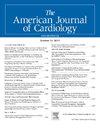Early Aortic Valve Replacement in Asymptomatic Severe Aortic Stenosis: A Meta-Analysis of Randomized Controlled Trials
IF 2.3
3区 医学
Q2 CARDIAC & CARDIOVASCULAR SYSTEMS
引用次数: 0
Abstract
Determining the best time for aortic valve replacement (AVR) in asymptomatic severe aortic stenosis (AS) with preserved left ventricular function remains controversial, as current guidelines recommend waiting until symptoms appear. Recent evidence suggests that early AVR may improve outcomes for select patients. This meta-analysis of randomized controlled trials evaluated the efficacy of early AVR, including surgical and transcatheter approaches, versus conservative management in asymptomatic severe AS. We systematically searched PubMed, Embase, CENTRAL, and ClinicalTrials.gov to identify eligible trials. The outcomes of interest included all-cause mortality, unplanned hospitalization, stroke, as well as the composite endpoint of each trial, which was derived from combinations of these outcomes. Four trials involving 1,427 patients were included. Early AVR significantly reduced the risk of unplanned hospitalizations (HR 0.42, 95% CI 0.33 to 0.53, p <0.001, I² = 0%). Although there was a trend towards reduced all-cause mortality, it did not reach statistical significance (HR 0.76, 95% CI 0.48 to 1.21, I² = 42%). Stroke also trended lower with early AVR (HR 0.63, 95% CI 0.40 to 1.00, p = 0.05, I² = 0%). In conclusion, these findings indicate that early AVR may provide clinical benefits by reducing adverse events in asymptomatic severe AS, in particular unplanned rehospitalization, suggesting that early AVR could be beneficial and should be considered in future guideline revisions.
求助全文
约1分钟内获得全文
求助全文
来源期刊

American Journal of Cardiology
医学-心血管系统
CiteScore
4.00
自引率
3.60%
发文量
698
审稿时长
33 days
期刊介绍:
Published 24 times a year, The American Journal of Cardiology® is an independent journal designed for cardiovascular disease specialists and internists with a subspecialty in cardiology throughout the world. AJC is an independent, scientific, peer-reviewed journal of original articles that focus on the practical, clinical approach to the diagnosis and treatment of cardiovascular disease. AJC has one of the fastest acceptance to publication times in Cardiology. Features report on systemic hypertension, methodology, drugs, pacing, arrhythmia, preventive cardiology, congestive heart failure, valvular heart disease, congenital heart disease, and cardiomyopathy. Also included are editorials, readers'' comments, and symposia.
 求助内容:
求助内容: 应助结果提醒方式:
应助结果提醒方式:


